- Home
- Sherry Thomas
The Magnolia Sword Page 14
The Magnolia Sword Read online
Page 14
He doesn’t say anything. I wonder if I’m dreaming. He should have been able to take on any number of wolves and emerge victorious. Tuxi called him the calmest and bravest man he has ever met. But there is no denying that he is still shaking. Less than before, but the tremors have not completely subsided.
“Are you afraid of wolves?” I can’t believe the words coming out of my mouth.
“I—I’m afraid of many things.”
I stare at him. Murong is afraid of many things—but he is still a child. Dabao is afraid of many things too, but he is, in essence, also a child. The young man before me has fought me three times and led us past a horde of bandits whole and unharmed.
“Are you also afraid of the dark?” That would explain why he came down to sleep with us in the barracks.
“No, but I’m afraid of being in a dark room by myself.”
He has an entire courtyard to himself at home. How did he manage there?
“Sleep,” I tell him—the same thing I would have told Murong if he crawled into my bed in the middle of a thunderstorm. “It’s time for my watch anyway.”
“I won’t be able to sleep now. You sleep. I’ll take your watch.”
But what if the wolves return? I can’t believe I’m doubting the princeling’s valor. But he would probably take the same precaution with me if bandits were roaming about. “We can both keep watch.”
He hesitates. “Bring your bedroll here. We can sit back-to-back.”
I do not hesitate nearly as long before I pick up my bedroll and join him. We wear our capes backward so that they form a tent. Underneath, we are separated by enough fabric and hide to make a real tent. Still, it is his back against mine, and I can sense the contours of his body and detect his smallest movements.
My heart beats faster as his warmth begins to seep into me. The muscles of my back and shoulders, made rigid by the cold, unclench one by one.
“So, how did you sleep all these years, in a courtyard by yourself?” I ask, more because I don’t want him to hear the thudding of my heart than anything else.
“When I was younger I had a nursemaid in the next room. Later, an attendant. And if I’m alone for some reason, I keep a lamp burning.” He sighs. “I guess you are not afraid of the dark.”
“No.”
“Or wolves.”
“No.”
“I don’t think you fear bandits either—it was just jitters,” he murmurs. “Is there anything you are afraid of?”
Yes. I’m afraid of never escaping the long shadow of my twin’s death—of never existing except as his inferior replacement.
“Your aunt,” I tell him. “I’m deathly afraid of your aunt.”
We both laugh at that. I love not only hearing the sound of his laughter, but also feeling those small convulsions of mirth against his back.
And speaking of his aunt, I suddenly remember something. “When I asked you why you don’t wish to kill my father to avenge your mother, you said you have seen my father. When? Does your aunt know?”
“I toured the Lake Tai region during my sojourn in the South, before I met with any of the referees. My goal was to speak to your father. And no, my aunt doesn’t know. I made a point of not asking for her permission.”
“But you never did pay my father a visit. Or—did you?”
I met with the princeling three times and never said anything to Father. Father could very well have met him and never said anything to me.
“I hired a pleasure craft. It glided by your house. Your father sat on the terrace, drinking tea and reading a book. It was such an idyllic scene—and I became as angry as I’d ever been in my life. My aunt was right: He was an unrepentant killer.
“Just then, a large manservant came and lifted him bodily to take him inside. The sight shook me—I’d had no idea he was paralyzed. I didn’t know what to think. Had it happened at my mother’s hand? Did my aunt know? And did I see something he wouldn’t have wanted me to see?”
“Most likely. He is very proud, my father. And his paralysis has been difficult for him,” I say, in reply to his last question. “Was that what changed your mind, knowing that he too has suffered? Was that what made you no longer want to kill him?”
“What?” His surprise sounds a little woolly, as if he is sleepy.
“No, I never wanted to kill your father.”
“Really? But your aunt …”
If the duel didn’t have rules against reprisals, there’s no telling what her ladyship would have done.
“My aunt isn’t the only one who raised me.” His speech is becoming slower and less precise. “She isn’t even the only one who raised me with cause to hate your father. But my father taught me that the first thing a general does after he ends a rebellion is to make sure that agricultural production goes back to normal. He does not burn the fields or punish the civilians. He does not make things worse.
“What would I have done, by killing your father, except make things worse for his family? And what would I have done, by wanting to kill him, except make things worse for me?”
I think of the royal duke looking at me with sympathy, just before our company left the ducal residence. At the time I couldn’t understand it—couldn’t even see not hating me on sight as a possibility for him. But like his son, he does not despise me. And he was sorry that my illusions were shattered, that the old enmity has once again created so much pain.
“Your father is wise,” I say, with more envy than I intended.
“My aunt thinks he might be too soft. She thinks I’m definitely too soft.”
His last few words are barely audible.
Sitting back-to-back does not seem to have the same invigorating effect on him as it does on me. I listen to his quiet, even breaths and look up at a magnificently starry sky, such as I haven’t seen since my last summer in the South.
“Wait,” I wonder aloud. “When you were gliding around on Lake Tai in that hired pleasure boat, did you see me too?”
He does not answer. After some time, his head drops onto my shoulder.
Kedan is smug: He was the first one up in the morning, so he saw the princeling leaning against me.
“I’m never wrong about special affection,” he declares for my ears alone, with much satisfaction.
“There were wolves at night, my brother,” I correct him. “His Highness’s and my watches overlapped. It was too cold to sit apart, so we sat together.”
The news of wolves sobers him a bit, but only a bit. “Nothing forges special affection like facing down wolves together.”
I shake my head and get on with my preparations for the day’s ride. But when Kedan isn’t looking, I glance toward the princeling, standing by his horse, checking the contents of his saddlebag. That much contact between us—under normal circumstances, a formal proposal of marriage had better be on its way. But by now it’s clear that where we are concerned, there are no normal circumstances.
And I still haven’t seen any unmistakable indication that he even knows I am a woman.
He looks up. Our eyes meet. Heat ricochets through me, but I do not look away. Neither does he, until Tuxi calls to him for something.
At noon we stop to rest our horses.
Thus far Rouran country has been thinly populated. We passed two bands of nomads, each about fifteen to twenty in number, traveling with their livestock, horses, and all their belongings. We also passed a few huddles of yurts—felt-and-fur-covered tents that can be easily taken apart and put together again—where other such small bands took up temporary residence.
Tuxi, our linguist, spoke to some of them but didn’t recoup any useful information. Admittedly he didn’t ask any direct or probing questions, as we don’t want word to get out that a group of travelers is suspiciously interested in the Rouran meeting ground.
“Shall we spar a little?” I propose to Tuxi and Kedan, before taking a sip from my waterskin. “We’ll be able to see anyone coming from several li away.”
The narro
w, hilly terrain we traversed the day before wasn’t suitable for training exercises. But today is all gentle rolling surfaces, and I don’t want to just sit while our horses graze.
The two men look at each other. Kedan puts on an exaggeratedly pained expression. “Only if you promise to have mercy on us.”
“I’ll take your place, Kedan xiong,” says the princeling.
“Then Hua xiong-di won’t have to worry about having mercy.”
I almost choke on the water I’m drinking.
Since morning I’ve been stealing surreptitious looks at him. He doesn’t seem any different: calm, graceful, yet with an inner ferocity that belies his unassuming demeanor. Nobody would believe me if I told them how terrified he was in the night.
This is a man afraid of wolves and being alone in dark rooms—can I make him afraid of me?
“You can take my place too, Your Highness,” says Tuxi. “I’ll just be in your way.”
Unhurriedly, the princeling unsheathes Sky Blade. “Shall we, Hua xiong-di?”
I take Heart Sea off my back and toss the scabbard aside. Both Tuxi and Kedan suck in a breath as they realize that we are holding highly unusual yet practically identical swords. Looking at the princeling now, I see no trace of the trembling boy, but only the inexorable rival who has always loomed large in both my imagination and my reality. What does he see when he looks at me? The conscript who needed to be rescued from bandits? Or the equal who will never cede him the duel?
Our swords clash, an impact that jolts my arm. But I welcome the discomfort because I’m not paralyzed by fear. We break apart, clash, and break apart again. I aim directly at his throat. He parries and kicks toward my solar plexus. I duck under the sweeping kick and thrust my sword where he is most vulnerable. He leaps sideways, pivots around, and slashes at my shoulder.
My mind is blank again, but it is a rewarding blank. No thoughts, only seeing. Sometimes I can predict what he will do, and I get there just a fraction of a moment earlier and take the upper hand. Other times he is too wily and canny, and I find myself under-rotated or overbalanced. Then I have to fight like a tiger not to face sudden defeat.
The grassland clangs with the metallic crash-and-scrape of our priceless blades jarring together again and again. Dimly it occurs to me that I want more of this sparring. Not strictly to win, but because it is exhilarating.
And beautiful.
Almost as soon as the thought happens, we leap apart and start circling each other. Now I see what the predawn darkness of our previous meetings obscured: the singular purpose in his eyes, a will to win that makes me quake somewhere in the depths of my heart.
I glare at him. No one is going to rob me of my courage again—not bandits, not Rouran soldiers, and especially not a boy scared of wolves and sleeping by himself.
I leap toward him. He meets me halfway. Again our swords clash.
“Stop!” cries Kedan. “Listen!”
The princeling and I break apart, both breathing hard. But I hear it now: horses in the distance, closing in fast.
The princeling sheathes Sky Blade. “Tuxi xiong and I will wrestle. Hua xiong-di, you get busy.”
We discussed this the night before. As much as possible, we will pretend to be a group of revelers, headed to a wedding at the foot of the Greater Khingan Range, far to the east. Tuxi will speak for us. Kedan and the princeling are his friends. I, who don’t know any of the tongues used beyond the Wall, am their mute servant.
I run to the horses and pretend to look after them. When the incoming riders stop a short distance from our group, Tuxi and the princeling are braced together. Kedan has plenty of opinions on the prowess of the wrestlers—or at least that’s what I assume he’s offering, since I can’t understand a word he’s saying.
They don’t drop the act until after the riders have had a good look at this trio of carefree, frolicking youths. Tuxi lets go of the princeling and hails the riders in an open, friendly manner. The riders are nowhere as amiable. None dismount; their leader asks Tuxi question after question.
Tuxi gestures at Kedan and the princeling, then at me. I stand with my mouth half-open in what I hope is a credible performance of bumpkin-ish naïveté. Tuxi then points to the east in an exaggerated fashion, indicating how far we still have to travel.
The lead rider isn’t satisfied. His next question has Tuxi clearly affronted. But the other riders close in and Tuxi smiles in supplication. He shouts something at me. After a moment of staring inaction, I jump to do his bidding, making sure to almost trip in the process.
I rummage through two different saddlebags before coming up with the item Tuxi wants—also agreed on the night before. Running to him, I make my strides heavy and clumsy, and put in another near-fall for good measure.
Tuxi clucks his tongue at me and shakes his head, but takes what I’ve brought and shows it to the riders. Salt, a solid rock, a most presentable wedding gift for friends in remote reaches.
A few more exchanges back and forth. The lead rider’s tone becomes friendlier. Tuxi waves over Kedan, who uses his small axe to chip off a palm-size chunk of salt. This handsome gift is wrapped in a piece of cloth and offered to the lead rider, who has the courtesy to come off his horse to receive it. Kedan gives him a friendly slap on the chest as he hands over the salt.
After the riders finally leave, tearing across the grasslands, I sidle up to Tuxi. “Rouran scouts?”
“Rouran scouts.”
They are headed east, in the direction of the rumored secret Rouran meeting ground. “Are they going to …”
The princeling is already marching toward his mount. “Let’s find out.”
At first I’m concerned that we might give ourselves away and the Rouran scouts will realize they’re being followed. But we ride at a leisurely pace, and after a while I start to worry about the opposite: that we’ll lose the Rouran party’s trail.
“No fear of that,” says Kedan, chewing on a piece of dried mutton. “Look at the ground. I can make out those hoofprints for days.”
I remember that he is a highly regarded hunter and tracker. “I guess I’m the only one who doesn’t possess any useful skills for life outside the Wall.”
Kedan laughs. “Hua xiong-di, don’t worry. Idiots live outside the Wall too—I’ve met my share. If you’re willing to learn, skills will come.”
“Can you teach me to read those trails?”
Kedan looks toward the princeling, who says, “When we come across the spot where they stopped to rest their horses, we’ll do the same. There you’ll have plenty of trails to show Hua xiong-di.”
It’s a long time before we stop. And when we do, the trails on the ground are too many: Rouran hoofprints, Rouran footprints, our hoofprints, our footprints, and prints belonging to animals and nomads that passed this way earlier.
Hoofprints I can make out by the indentations they leave. But the soil is hard and I am sure that I myself leave no marks.
“Granted, you walk very lightly, Hua xiong-di. But I see your prints.”
With his sheathed dagger, Kedan draws an outline around one of my prints. I have to put my face very near to the ground and squint to see the faint impression left behind by my boot. And even then I’m only half-confident that I am in fact seeing and not imagining it.
Kedan points. “This other footprint of yours lies on top of the Rouran scout leader’s and—”
“How do you know it’s his?”
“He was the only one who came off his horse earlier, to receive the salt from us. Also, he is the only one in leather boots. The others with him have footwear made of cloth, and they walk more gingerly on the ground.”
“You have a remarkable eye!”
“Trust me, Hua xiong-di. I possess no skill as remarkable as that of knocking three arrows at once out of midair while riding at a fair clip. This is just the result of practice.”
“I could say the same about knocking multiple objects out of midair—just the result of practice.”
We grin at each other. I slap him on the shoulder in brotherly appreciation.
“Tell me what you observed of the Rouran riders,” he says. “You must have noticed different things than I did.”
“I think the rider at the rear is the best fighter. And he is left-handed, which would make him a difficult opponent for me—if, that is, I don’t fall into a dead faint should he come at me. What did you notice?”
“I was looking at the condition of the horses, wondering how much distance they’ve already covered today. What about you, Tuxi xiong?”
Tuxi rubs his chin. “To me the man’s accent didn’t sound as if he hails from this region, or areas farther east. I wouldn’t be surprised if his origins are far, far west of here.”
“I can’t comment on the man’s origins,” says the princeling. “But the horses—they are of the breed for which Emperor Wu of Han waged two different campaigns against the kingdom of Dayuan.”
Dayuan lies beyond the Takla Makan Desert, even beyond the Heavenly Mountains, which I have always considered impossibly far. There are, of course, realms even farther away, including the eminent yet mysterious empire that produces a luminous glassware much prized in wealthy households.
But those lands and their peoples have been no more real to me than the immortals who dwell in the Nine Heavens. And the campaigns the princeling refers to, waged with sixty thousand soldiers, took place five hundred years ago.
“Dayuan horses are said to sweat blood, aren’t they?” I ask the princeling. Or a reddish perspiration, to be more precise, from the shoulders.
He nods. “When the scout leader dismounted, his sleeve brushed his horse at the withers. His cuff was stained a light reddish color.”
“Those were the divine horses?” Kedan exclaims in disbelief. “They were ugly!”
The Rouran horses did have a lean, scrappy, almost hungry look, with their elongated bodies and prominent rib cages.
“They weren’t prized for their appearance,” I say, recalling what I’ve read of the breed in the Records of the Grand Historian. “But they were said to possess extraordinary stamina, able to cover a thousand li in a day.”

_preview.jpg) Claiming the Duchess (Fitzhugh Trilogy Book 0.5)
Claiming the Duchess (Fitzhugh Trilogy Book 0.5)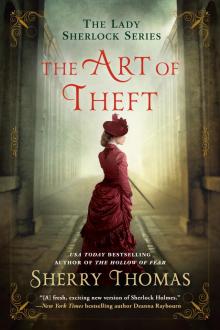 The Art of Theft
The Art of Theft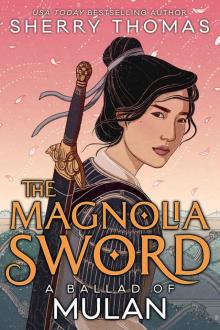 The Magnolia Sword: A Ballad of Mulan
The Magnolia Sword: A Ballad of Mulan A Study In Scarlet Women
A Study In Scarlet Women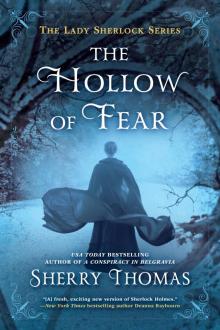 The Hollow of Fear
The Hollow of Fear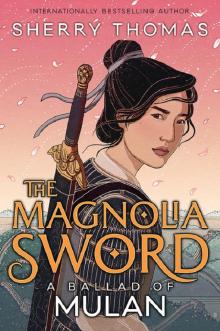 The Magnolia Sword
The Magnolia Sword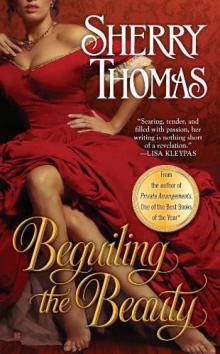 Beguiling the Beauty ft-1
Beguiling the Beauty ft-1 The Heart is a Universe
The Heart is a Universe The Hidden Blade: A Prequel to My Beautiful Enemy (Heart of Blade)
The Hidden Blade: A Prequel to My Beautiful Enemy (Heart of Blade) Ravishing the Heiress ft-2
Ravishing the Heiress ft-2 The Immortal Heights
The Immortal Heights The Hidden Blade
The Hidden Blade Ravishing the Heiress
Ravishing the Heiress Tempting the Bride
Tempting the Bride The Luckiest Lady in London
The Luckiest Lady in London The Bride of Larkspear: A Fitzhugh Trilogy Erotic Novella
The Bride of Larkspear: A Fitzhugh Trilogy Erotic Novella Claiming the Duchess
Claiming the Duchess The One in My Heart
The One in My Heart His At Night
His At Night A Dance in Moonlight
A Dance in Moonlight A Conspiracy in Belgravia
A Conspiracy in Belgravia Not Quite a Husband
Not Quite a Husband